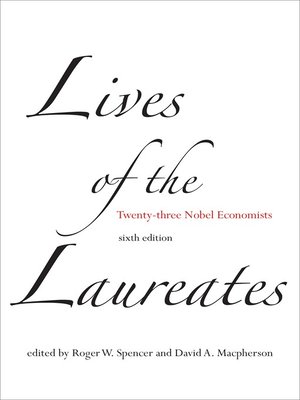
Sign up to save your library
With an OverDrive account, you can save your favorite libraries for at-a-glance information about availability. Find out more about OverDrive accounts.
Find this title in Libby, the library reading app by OverDrive.



Search for a digital library with this title
Title found at these libraries:
| Loading... |
Autobiographical accounts by twenty-three Nobel laureates give a picture of the richness of contemporary economic thought and insights into the creative process.
Lives of the Laureates offers readers an informal history of modern economic thought as told through autobiographical essays by twenty-three winners of the Nobel Prize in Economics. The essays not only provide unique insights into major economic ideas of our time but also shed light on the processes of intellectual discovery and creativity. This fifth edition adds five recent Nobel laureates to its list of contributors: Vernon L. Smith (2002), Clive W. J. Granger (2003), Edward C. Prescott (2004), Thomas C. Schelling (2005) and Edmund S. Phelps (2006). Also included is the editors' revised afterword, "Lessons from the Laureates."
Lives of the Laureates grows out of a continuing lecture series at Trinity University in San Antonio, which invites Nobelists from American universities to describe their evolution as economists in personal as well as technical terms. Each laureate achieves the goal of clarity without sacrificing inherently difficult content: Kenneth Arrow makes grasping the essentials of his "impossibility theorem" painless; Lawrence Klein clearly presents what goes into econometric "model building"; George Stigler masterfully describes his "information theory"; and so on. These lectures demonstrate the richness and diversity of contemporary economic thought. The reader will find that paths cross in unexpected ways—that disparate thinkers were often influenced by the same teachers—and that luck as well as hard work plays a role in the process of scientific discovery.






